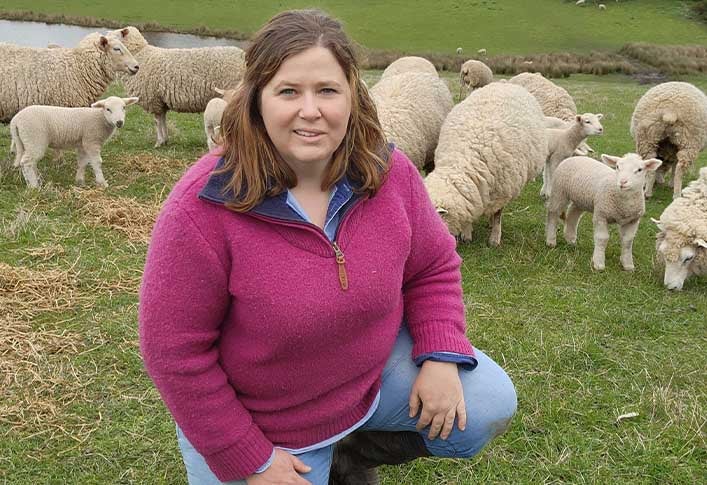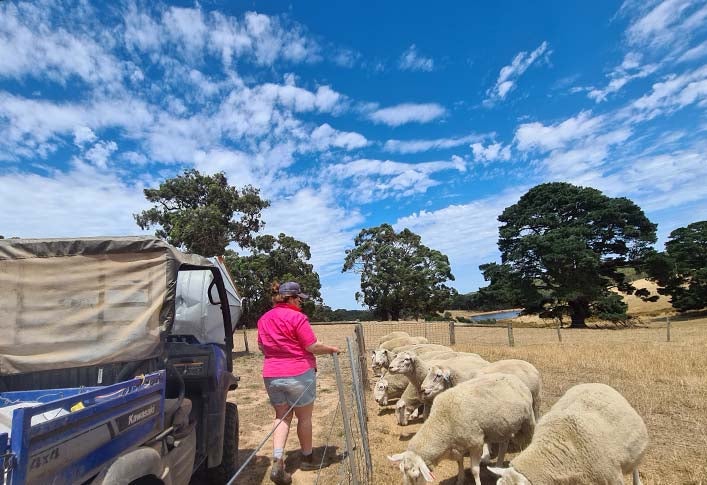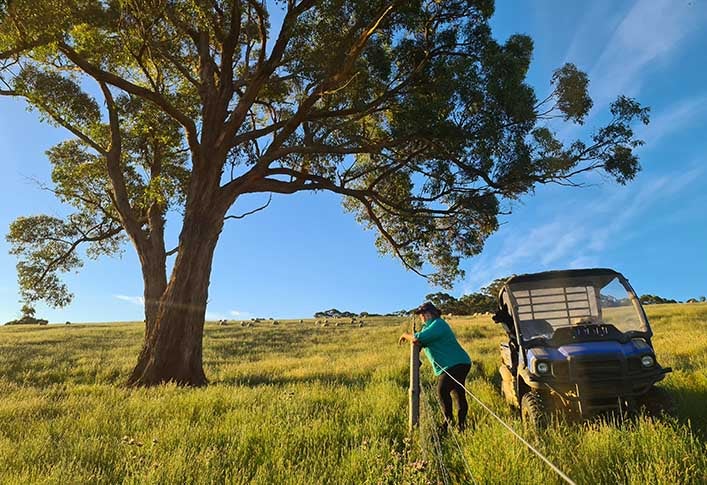Posted by on
09/09/2022
As producers, how can we help sheep in intensive livestock production systems ‘beat the boredom blues’?
It’s an issue that fascinates South Australian farmer Sammy McIntyre, and one she now has the opportunity to explore in depth.
Announced this week as one of 18 successful recipients of a 2023 Nuffield Scholarship, Sammy’s opportunity will be sponsored in full by Rabobank.
With the global agricultural industry at her disposal, 34-year-old Sammy will now travel across various continents researching her chosen topic, “the benefits of enriched environments for intensive sheep production, and practical steps for producer implementation”.
For some, Sammy believes the issue of ensuring sheep in feedlot scenarios remain stimulated may sound ‘feel good’, but results so far show genuine, tangible benefits for producers, and stock.
“There is practically zero guidance for producers on this topic. The MLA Strategic Plan 2025, Red Meat 2030, Wool 2030, plus Sheep Sustainability Framework all recognise that animal welfare, ethical production and a social license to operate will be key to our industry due to increased scrutiny from consumers.”
“By helping producers understand the production benefits of pen enrichment, providing guidance on practical steps for implementation and demonstrating to consumers what we are doing to improve animal welfare in this area, we will be well-placed to meet these strategic priorities.”
From studies so far, Sammy has identified a number of production benefits resulting from enriched environments – spaces that ultimately prevent animals getting bored.
“In one study it was revealed lambs gained 56 grams a day more than those in traditional penned areas, with blood indicators suggested lower stress levels, and higher levels of immunity to disease,” she said.
Meat quality was also improved, producing a more tender product with lower pH.
A similar study on goats found stock grew 83 per cent larger than those in non-enriched environments, while eating the same amount of feed.
“As a producer, you hear these figures and think why wouldn’t you? Enriching environments is a low cost input for a huge return, resulting in animals that are healthier and happier for it.”
While many may visualise an elaborate sheep playground, she said the reality was surprisingly simple.
“Examples include producers erecting ramps in pens, nothing fancy, just a small ramp, about the size of an A4 piece of paper, 30cm off the ground that sheep can step up and over.”
“Old tyres or railway sleepers that stock can climb over has worked well for goat producers, as have bales of straw to rummage through.”
A topic inspired by watching poddy lambs play in her own family’s orphanage nursery, Sammy intends to install tyre platforms and mounds into their feedlot operation for both production, and welfare benefits.

Progressing at an industry level, and at the farm gate
Heavily involved in her family’s property “Hillstream” on the Fleurieu Penninsula, Sammy helps manage a self-replacing prime lamb enterprise of 1,100 breeding ewes.
The Fleurieu livestock operation is run in conjunction with cropping and feedlot/lamb finishing enterprises on the Yorke Peninsula.
In addition to carrying out general sheep handling, husbandry duties and pasture management, Sammy oversees livestock operations, determining the operation’s strategic direction and setting production, animal welfare and sustainability targets.
Spearheading a total overhaul of the “Hillstream” sheep enterprises, and the implementation of several best practices resulted in a significant improvement in productivity by increasing ewe fecundity and lamb survival, and reducing ewe mortality.
“During the past 12 months we have shifted to a self-replacing composite model, and the use of individual animal management technology, and I’m always excited by what productivity and efficiency gains we can make going forward.”
Unlocking knowledge through Nuffield
Committed to continual improvement and enjoying a healthy thirst for knowledge, Sammy said applying for a Nuffield Scholarship seemed like a natural progression.
“I don’t know too many other agricultural learning opportunities that are on the same scale as the Nuffield. It’s unique in that scholars are fully entrusted to go onto the world stage seeking answers to their questions.”
A long-time passionate ‘young aggie’, Sammy first came across the Nuffield Scholarship as a teenager, flicking through the pages of the Stock Journal.
“Back then the application age of 28 felt like a lifetime away, if only I knew what I know now!” she smiles.
Sammy will now plan her globetrotting research assignment, however initially she’s keen to investigate whether any Australian feedlots are completing work in enriching space for livestock.
“There’s quite a lot of research on this issue for pigs and chickens, as they’re such highly intensive industries, and there’s a bit being done in the beef and dairy cattle space, but overall the translation of the research into real-world awareness and implementation on farms is really lacking in the ruminant space.”
“While I have a focus on sheep, I can already see the benefits for other livestock producers, including beef cattle, goat feedlots and fully-housed dairies”
Continents with cold winters, where sheep and cattle are housed for lengthy periods, could provide inspiration, and she’s buoyed by the uptake of cattle brushes – designed to scratch and massage cattle – in international sheds and yards.
Sammy thanked Rabobank for sponsoring her scholarship, and said she was looking forward to connecting with the wealth of resources she could now access.
“As a global bank I feel really fortunate that I will now have access to Rabobank clients world-wide, clients who will help me navigate this topic.”
“Rabobank’s values are very aligned with my own, and that is to help feed the world more sustainably, and support our farmers – and ultimately my research aims to help feedlotters produce a better product for their businesses and the consumers, while contributing to added health benefits for the animal, at very little extra cost.”

